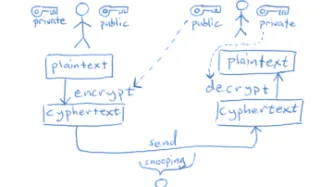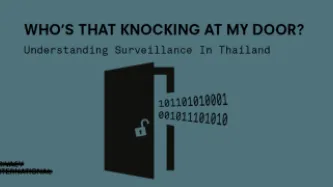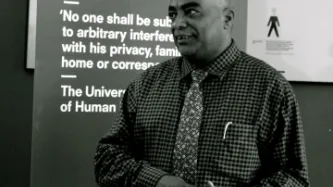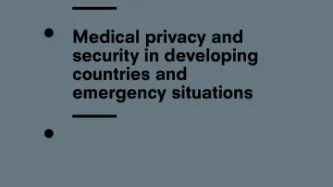Search
Content type: News & Analysis
The past few years have seen a huge rise in the number of attacks both active and passive, against organisations big and small. Attacks against organisations happen for a multitude of reasons: extortion via "ransomware", exfiltration of commercial secrets, or just "the lulz". While this can be crippling to a commercial business, it can potentially be devastating to an NGO, especially those which work to hold powerful institutions to account. The types of information held by such NGOs could…
Content type: News & Analysis
Dear Politicians,
With elections coming up and quite a few cringe-worthy comments that have come from many of you and from all sides of the political spectrum, we figured it was time to have a chat about encryption.
First, let’s say what you shouldn’t do:
call for boycotts of companies because they protect their users’ data even from the companies themselves.
say something like “we’ll develop a Manhattan-level project on this” (which, as we’ll remind you, ended up with the creation of a…
Content type: News & Analysis
On a hot day in Nairobi, our researcher is speaking to an officer of Kenya’s National Intelligence Service (NIS). The afternoon is wearing on and the conversation has turned to the presidential elections, taking place in August this year. He has just finished describing the NIS’ highly secret surveillance powers and the disturbing ways in which these powers are deployed.
“It is what you might call ‘acceptable deaths,’” he states about the misuse of communications surveillance powers. “People…
Content type: News & Analysis
Technologists hoped the “Crypto Wars” of the 1990s – which ended with cryptographers gaining the right to legally develop strong encryption that governments could not break – was behind them once and for all. Encryption is a fundamental part of our modern life, heavily relied on by everything from online banking and online shopping services to the security our energy infrastructure.
However, from comments by the French and German governments about creating a European initiative to circumvent…
Content type: News & Analysis
In our latest report “Who’s that knocking at my door? Understanding surveillance in Thailand”, we highlighted various methods of surveillance that the Thai Government employs. Included in these methods was the finding that Microsoft was the only technology company which by default trusts the Thai Government’s root certificate. Root certificates ensure the validity of a website, and protect users from being tricked into visiting a fake, insecure website. Most technology companies including Apple…
Content type: Long Read
This piece originally appeared here.
On both sides of the Atlantic, we are witnessing the dramatic expansion of government hacking powers. In the United States, a proposed amendment to Rule 41 of the Federal Rules of Criminal Procedure would permit the government to obtain a warrant, in certain circumstances, to hack unspecified numbers of electronic devices anywhere in the world. Meanwhile, across the pond, the British Parliament is currently debating the Investigatory…
Content type: News & Analysis
Everyone wants to know what you need to do to be i) happy, ii) fit, iii) secure. And the easier and more listy it is, the better.
The Guardian recently published an article that left PI’s techies sceptical, to say the least. “Extreme online security measures to protect your digital privacy – a guide” offered nine pieces of advice to stay secure online, including covering your house with a few layers of aluminium (!!!).
While there is no one-solution-fits-all when it comes to security and…
Content type: News & Analysis
This article originally appeared in Indepedent Voices here.
Since the horrific Brussels and Istanbul attacks we've all looked at our daily lives and saw vulnerability and risk. Where else could terrorists attack?
We begin to formulate security responses. CCTV, communication, surveillance, identity cards - they aren't panning out. Perhaps we need to take things to the next level? How about we build an uber anti-terrorism system that grinds all our data together and identifies the people…
Content type: News & Analysis
We are on the verge of a revolution in government surveillance powers.
Previously it was simple. Governments demanded access to our homes. Then our communications. Then they demanded access to whatever companies held on us. Then they complained that technology was making this harder, and demanded that technology be designed for them. With every step, safeguards were reduced.
Next governments will demand that companies betray their users and use our technologies to compromise us.
In…
Content type: News & Analysis
While two of the Vice journalists who were recently arrested in Turkey and charged with terror offenses have now been released, this remain a deeply concerning incident.* It is the latest episode in what is a pincer movement against our right to protect our data.
Two British journalists and their Turkey-based Iraqi translator working for VICE News were arrested last Thursday and charged with "engaging in terrorist activity". According to Turkish authorities, one member of the group had an…
Content type: News & Analysis
Every government seems to want to spy in Pakistan. The US' National Security Agency (NSA) tapped the fibre optic cables landing in Karachi, among others, and used 55 million phone records harvested from Pakistani telecommunications providers for an analysis exercise. The United Kingdom's Government Communications Headquarters (GCHQ) had a store of SIM keys from Mobilink and Telenor networks, two of the country's biggest providers.
But the Pakistani government, specifically the…
Content type: Press release
The Investigatory Powers Tribunal (IPT) today revealed that the UK Government Communications Headquarters (GCHQ) spied on two international human rights organisations, failed to follow ITS own secret procedures and acted unlawfully.
The targeted NGOs are the South African Legal Resources Centre (LRC) and the Egyptian Initiative for Personal Rights (EIPR). Both are leading civil liberties organisations and co-claimants alongside Privacy International, Liberty,…
Content type: News & Analysis
A sizeable political controversy has engulfed President Goodluck Jonathan’s Government in Nigeria, where details surrounding its plans for the total surveillance of Africa’s most populous country continue to emerge.
Thanks to pervasive snooping technology readily found and developed in the US, UK, Israel and the Netherlands, the already spy-equipped security forces in Nigeria will have greater and more intimate access to the lives of some 56 million Internet users and 115 million active fixed…
Content type: News & Analysis
Between 15th-19th of September, in the week leading up the first year aniversary of the 13 Necessary and Proportionate Principles, Privacy International and the coalition behind the 13 Principles will be conducting a Week of Action explaining some of the key guiding principles for surveillance law reform. Every day, we'll take on a different part of the principles, exploring what’s at stake and what we need to do to bring intelligence agencies and the police back under the rule of law. You can…
Content type: News & Analysis
After suffering years of persistent harassment, violence, and surveillance at the hands of his oppressive government, Tadesse Kersmo had enough. Tired of living under constant monitoring, Tadesse and his wife escaped Ethiopia, where they had been politically active for years, and were granted asylum in the United Kingdom in 2009.
It was only a few years later that they discovered that this escape was an illusion, and that they had been followed from Ethiopia to England. He may have left his…
Content type: News & Analysis
In a move that echoes strong action taken in the past by European officials to protect privacy, the Belgian and Dutch data protection authorities on Wednesday announced that they will begin an investigation into the security of the SWIFT financial system.
The announcement comes on the heels of our letters to twenty-eight European DPAs last month, which sought answers regarding the NSA's reportedly unauthorized access to SWIFT's financial messaging system and asked for an…
Content type: News & Analysis
Privacy International today is proud to announce our new project, Aiding Privacy, which aims to promote the right to privacy and data protection in the development and humanitarian fields. Below is an outline of the issues addressed in our new report released today, Aiding Surveillance.
New technologies hold great potential for the developing world. The problem, however, is that there has been a systematic failure to critically contemplate the potential ill effects of deploying technologies in…
Content type: Report
New technologies such as mobile phones and electronic medical record (EMR) systems promise to transform the provision and management of medicine all over the world. In the U.S. alone, billions are being spent on information technologies for healthcare.
This eHealth revolution could be a boon for patient privacy if the right protections are built into new health information systems; however there are growing worries that privacy and security are being overlooked by designers rushing to deploy…
Content type: News & Analysis
It is common knowledge that surveillance technologies keep us safe. These technologies can uncover where a would-be bomber has fled or reveal that a suspect is planning an attack on the New York City subways. Such successes, and the belief - and business - in them has fueled a vast expansion of CCTV, wiretapping and data mining since 9/11, the Madrid bombings in 2004 and the attacks on London's public transport system in 2005. But this common knowledge is based, at best, on shaky evidence. In…
Content type: News & Analysis
Together with a coalition with 18 Japanese rights groups, Privacy International today delivered a letter to the Japanese Minister of Justice to protest against the implementation of a fingerprinting system and face-scanning system at its borders. All visitors and many foreign residents to Japan will be fingerprinted under this plan. Our letter to the Minister is endorsed by 68 organisations from 30 countries. In our letter, we show that there are numerous problems with the government's plans.…
Content type:
Content type:
Content type:
… spur abuses around the world — the very things which cause insecurity in the first place. If these ‘benefactor’ … spur abuses around the world — the very things which cause insecurity in the first place. If these ‘benefactor’ …
Content type:
Content type:
… Identity systems create and facilitate exclusion, insecurity, and surveillance. On Identity Day, PI with our … identity systems creating and facilitating exclusion, insecurity, and surveillance. And yet, we repeatedly see … identity systems creating and facilitating exclusion, insecurity, and surveillance. And yet, we repeatedly see …















